 |
None of the Beatles are female. Neither are any of the Rolling Stones. Nor were any of the
bands that followed in their wake. Back in the 50s and 60s, rock and roll was played for women,
never by women. But, like so many other things, the 70s appear to have changed all that
for good. Rock is no longer exclusively male. There is a new royalty ruling today's record
charts that is led by artists with names like Linda Ronstadt, Stevie Nicks, Carly Simon and
Joni Mitchell.
They are the Queens of Rock - shrewd, complex and talented businesswomen who have conquered a macho industry and made it work for them. They live in a world with a new morality. Sex, money and highs of every kind are abundant. Stability, companionship and the sanity of a balanced life are not. |
|
But the Queens of Rock have come to symbolize a new culture and a new reality for the music
world - and perhaps for the rest of us as well. Their accounts of their men, their money and
their often tortuous times on the road provide a vivid picture of the staggeringly high stakes -
emotional and financial - involved in their lives.
Male rock figures face the same problems. But that's no longer news. What is news is how female rock stars are making an art of their life styles. Their songs, even the ones they don't write, have become part of their identities. We feel they're singing about themselves, telling us what it's like to be a woman in a man's game. No subject is taboo, not even the sexual double standard.
"...you're keepin' me going
I know it's insane
Cause I'll love you and lose again"
|
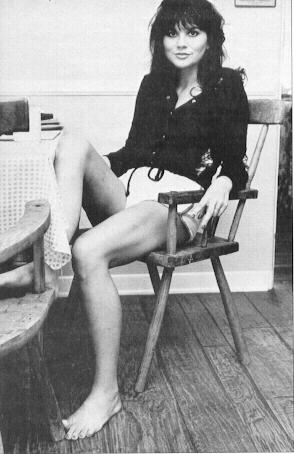 |
Linda Ronstadt, at 31, has built a successful career singing about being a loser in love.
"All I've done in my music is acknowledge that I've been hurt," Ronstadt admits. "I've been
crippled, but I'm still walking. Ever since I was 6 years old, I've been looking for the
perfect boyfriend. But I've wanted to be a singer since I was 2, and when it came right down
to it, I would never give up the singing for any old boyfriend."
When she tours, Ronstadt packs her troubles into a luxury trailer-bus equipped with five separate stereo systems and tapestried ceilings. The raven-haired, Arizona-born singer even hired a female traveling companion to "provide a feminine edge." In the past, Ronstadt found herself involved in all-night poker games with the boys. "I usually came home talking like a truck driver," she laments. |
|
But, it's how she sings that counts, and Ronstadt's torchy, country-cured soprano has made
her the best-known woman in rock. She has sold more than 17 million albums to date, the last
five going platinum at an estimated gross of more than $60 million. The former Tucson debutante,
who began singing in 1969 (sic) with a group called the Stone Poneys, has paved the way for
dozens of other women in music, including Karla Bonoff, whose songs Ronstadt often records.
"When I first started," she recalls, "Maria Muldaur and I were the only women touring - freaks
as far as the rest of the world was concerned. Maria pulled me through some terrible times.
Being on the road is akin to violence. It's fast moving, and relationships are wrenched away."
To protect herself from the rough rigors of the road, Ronstadt hired super-manager-producer Peter Asher, who handles the dynamics between his client and her all-male band, other managers, promoters and the press. "He keeps them from moving in on me like a herd of barracudas until there's no flesh left on my bones." As her record producer, Asher has also helped Ronstadt develop a distinct vocal style. He guided her to a musical world poles apart from the protest songs of the 60s, songs that she found hypocritical. "I'm known as a belter," says Ronstadt graciously. But she's more than that. The cutting edge of her voice removes any trace of ritual sentimentality from her country material. She never merely moans about being hurt by men ("I've been cheated, been mistreated... "), she bitches about it (" . . . when will I be loved?"). And her voice can be hard, even mean. Ronstadt can be pretty mean when it comes to defending herself against those who infringe on her territory. The 5-foot, 2-inch rocker recently bought herself a modest-looking $325,000 house in Malibu. The place is a refuge from the road, not only for Ronstadt, but for her circle of friends, made up of L.A.'s musical elite (Jackson Browne, Andrew Gold and the Eagles). They have also helped Ronstadt solidify her musical image. "I won't step out of character," she says about her choice of songs. "I won't do things that aren't authentically me." |
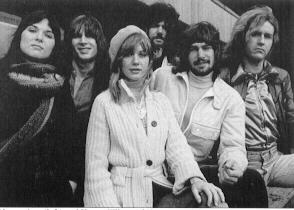 Above: Ann (left) and Nancy Wilson of Heart complain about the lack of "any women to relate to" on the road. Below: Linda Ronstadt shares the concern. 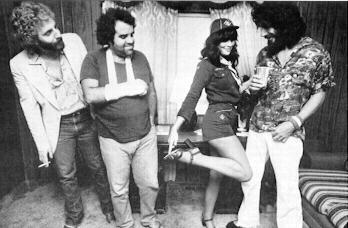
| From the sound of things, the "authentic" Ronstadt is as troubled as ever by her
relationships with men. "Those are the things I like to express in my music," she insists.
Those are also the things drawing the most curiosity.
Ronstadt's romances get as much press as her concerts and include such diverse celebrities as Mick Jagger and California's bachelor governor, Jerry Brown. Comments Ronstadt: "I keep saying I wish I had as much in bed as I get in the papers. I'd be real busy." Still, Ronstadt isn't doing much to counteract her image as rock's "hottest" act. Her onstage Cub Scout outfit, with hot pants and high heels, caused a sensation. But the "hooker streak" she recognizes in herself hasn't hurt her record sales or her loser-in-love image. On her new album, Ronstadt gently mocks that image in "Poor, Poor, Pitiful Me." Sometimes, especially when she finishes a long tour, Ronstadt isn't laughing. "There aren't all these people down the hall anymore," she says almost wistfully. "The guys all go home to their old ladies and I go home to the dog." |
"We love our lovin'
But not like we love our freedom"
Joni Mitchell, 34, is another rock queen who, like Ronstadt, chooses to "go home to the dog,"
if going home to someone else means artistic compromise. According to Ronstadt, "Joni is the
first woman to match any man on his own terms as a songwriter, guitar player or as an incredibly
magnetic human being." Women guitar players are rare in rock, but rarer still are artists with
Mitchell's versatility. She started as a folk singer about 13 years ago, and since then has
broadened her range to include jazz, reggae and rock.
Above all else, Mitchell is dedicated to her independence. At 19, she married cabaret performer Chuck Mitchell. It lasted about 18 months.
Mitchell's first songs developed from her reactions to her failed marriage. "I can't go back there anymore," she wrote. In her songs, she was a "woman of heart and mind, with time on her hands, no child to raise." The urbanized poetry of Mitchell's lyrics is in contrast with her straight-out-of-the-prairies music, and perfectly traces the growth of the women's consciousness movement from its center, rather than its extremes. A whole generation came of age with Mitchell and such songs as "Chelsea Morning," "I Don't Know Where I Stand" and "Both Sides Now." Mitchell found most of the material for her lyrics in her travels. "In a pure, anonymous encounter you find a world alive and full of character," she says. Along the way, she became involved with James Taylor, David Crosby, Jackson Browne, Leonard Cohen and Graham Nash. "The rock-and-roll-industry is very incestuous," Mitchell explains, "and we have all been close at one time or another. A lot of beautiful music and a lot of beautiful times came from that. A lot of pain, too, because, inevitably, different relationships broke up." Like Ronstadt, Mitchell is forced to go on the road - "stoking the star-maker machinery behind the popular song." She does it because financial success allows her the freedom to pick and choose, to go places where she can be anonymous. "Freedom is necessary for me in order to create," Mitchell insists. "The most important thing is to write in your own blood." |
"He's a lotus, that opens and closes
Notice he won't always let me in. . . "
Carly Simon, 32, views her life differently than either Ronstadt or Mitchell. Married to
singer-songwriter James Taylor, 29, for five years and the mother of two small children, Simon
has let her career take a back seat to her husband's. "Either I keep the record company happy
and neglect my family," Simon explains, "or I put my family first - the sensible thing to do.
Despite her huge success with "You're So Vain" and the current "Nobody Does It Better," Simon rarely tours. In addition to her painful shyness and the time it takes away from her family, there are real competitive problems between the couple. "There have been moments of terrible friction based on who is higher on the charts," Simon admits. "We're jealous of each other and proud of each other at the same time. It's more comfortable if James is more successful than I am. Where we run into problems, and where I start complaining about being used and abused, comes from my own willingness to be subservient." Simon and Taylor are loath to air their difficulties in public. But their relationship is sharply defined in their songs. One Simon lyric accuses: "However much I tell myself/that I'm strong and free and brave/I'm just another woman/raised to be a slave. "In the beginning," adds Simon, "I wanted all my songs about James to be positive and then I thought, 'That's b---s---. You don't always have positive thoughts about the person you're living with.'" Although Simon has never garnered the critical approval of a Ronstadt or Mitchell, her sensuous song stylings continue to sell strongly. The album art doesn't hurt either. The Playing Possum cover, showing Simon crawling sexily on the floor in a black slip, received better reviews than the record. That's another area of exploitation Simon promises to keep an eye on in the future. For now, she's concentrating on
finding a way to combine her marriage
and her career. "My pipe dream," says
Simon, "is James and I traveling
around together in a much less high-powered scene. Just a kind of motor
home." "Rock on-gold dust woman
Take your silver spoon,
And dig yourgrave. . ."
Carly Simon may be content with her pipe dreams, but not Fleetwood Mac's souped-up Stevie Nicks. At 29, Nicks is one woman rocker who was always determined to make it.
Nicks did meet the man she would
live with for the next six years. His
name was Lindsey Buckingham, now Fleetwood Mac's lead guitarist. The romance didn't develop
until Fritz flopped and the duo formed Buckingham Nicks. That's when Fleetwood heard one of
their tapes and asked them to join his group. The rest is rock history, with Mac's last album,
Rumours, selling a whopping eight million copies. Nicks can take a lion's share of credit for the group's success. Her kittenish stage presence gave the group a much-needed jolt of sex appeal. Christine McVie, the other woman in the five-member band, was another asset, but her songs and stage manner lacked Nicks's off-the-wall punch. It's no wonder the group is worried about Nicks's recent vocal problems. If she were forced to cancel a tour because of illness, Fleetwood Mac could easily lose that particular chemical balance that has finally - after 10 years of only modest success - turned them into the top rock group. The personal problems among the group were also turned to gold in Rumours, with everyone writing songs about their personal relationships. In "Dreams," Nicks sings of her breakup with Buckingham. She sums up the situation this way: "I couldn't be a comfort to Lindsey. Try working with your secretary in a raucous office and then come home with her at night. See how long you could stand her." These days Nicks stays pretty much to herself, caring for her strained vocal chords and developing her craft. "In my position," she declares, "I could meet a lot of people just because of the band I'm in. Well, I don't want to meet anybody because of the band I'm in." For Nicks, and for many other queens of rock, loneliness has become a fact of life to deal
with, but not to be defeated by. Some times are easier than others. Nicks refers to a latter
time: "I had been to the Rock Awards and we won Best Group and Best Album. Everybody was really
blissed out. We came home, my brother and I, in the back of this big, black limousine and I
was so lonely it scared me."
"Nobody knows your melancholy
mind-little queen. . . "
There are other female rock stars on the way up who have had the path outlined for them by these four queens. Seattle's Heart, fronted by sisters Ann and Nancy Wilson, just had a million-selling album with a hit single, "Little Queen," and they tour incessantly. "One of the hardest things," 24-year-old Ann says, "is that there are never any women to relate to. Sometimes it takes a girl to relate to another girl. I'm lucky I have my sister." Both Heart women are involved with co-workers in the band, Nancy with guitarist Roger Fisher and Ann with his brother Michael.
Lita Ford, lead guitarist of the all-girl band The Runaways, puts it another way. "You don't have to have muscles to play a guitar." Nevertheless, most women in rock bands are singers rather than instrumentalists. One exception is Tina Weymouth, who got her job through boyfriend Chris Frantz, New York's Talking Heads drummer. "They wanted a 16-year-old boy, somebody without too many preconceptions. I understood everything they were doing theoretically and conceptually - the only difference was that I was a 23-year-old girl." Debby Harry, 29, the blond bombshell in the black boots and dress who sings lead in Blondie, says, "You will undergo a tremendous amount of pressure but there's no choice, you have to stick with it." Says Lita Ford: "I used to look up on the stage and see the bands and think, 'That looks
like so much fun!' And now, I get up there and - it is fun!" Since fun knows no gender,
today's rock generation may find its kids asking why only men played rock for so long.
Considering the diversity and talent of these Queens of Rock, that's going to be a
tough one to answer.
|
 The most artistically complex of the rock queens, Mitchell was born in Alberta, Canada.
Today, she divides her time between a cabin in Vancouver and her Los Angeles home.
The most artistically complex of the rock queens, Mitchell was born in Alberta, Canada.
Today, she divides her time between a cabin in Vancouver and her Los Angeles home.
 Simon, a self-described "no-good little brat from the upper East Side," was never hungry for
a career. A Simon of the Simon & Schuster publishers, she was brought up with the trappings of
wealth. Singing was just something she drifted into during the early 60s with her sister, Lucy.
"I had been educated in a way that didn't have much space for women's opportunities except
marriage," she says.
Simon, a self-described "no-good little brat from the upper East Side," was never hungry for
a career. A Simon of the Simon & Schuster publishers, she was brought up with the trappings of
wealth. Singing was just something she drifted into during the early 60s with her sister, Lucy.
"I had been educated in a way that didn't have much space for women's opportunities except
marriage," she says.
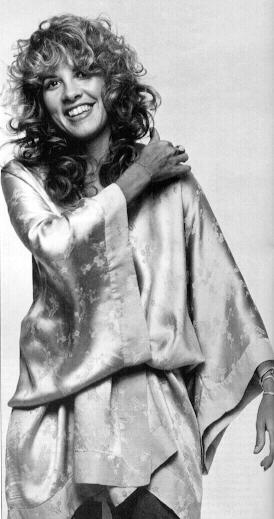 Daughter of a retired Greyhound
executive in Phoenix, Nicks dropped
out of San Jose State College shortly
before she was to graduate to join a
rock band called Fritz. "Nobody in the
band wanted me for a girlfriend. I was
just too ambitious for them."
Daughter of a retired Greyhound
executive in Phoenix, Nicks dropped
out of San Jose State College shortly
before she was to graduate to join a
rock band called Fritz. "Nobody in the
band wanted me for a girlfriend. I was
just too ambitious for them."
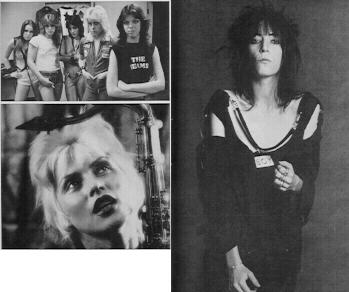 Godmother to the new wave's punk rock, Patti Smith, 31, sees no conflict between rocking
hard and being feminine. "Mick Jagger proved you could do it years ago," she jokes. "But
art transcends all that stuff, these new girls are more animal in their approach and the animal
in you is where you get all your best work from."
Godmother to the new wave's punk rock, Patti Smith, 31, sees no conflict between rocking
hard and being feminine. "Mick Jagger proved you could do it years ago," she jokes. "But
art transcends all that stuff, these new girls are more animal in their approach and the animal
in you is where you get all your best work from."